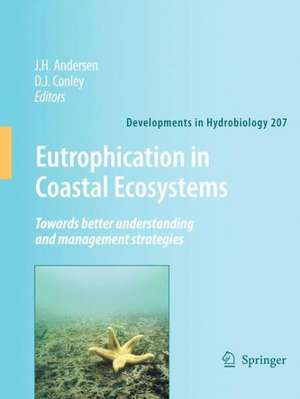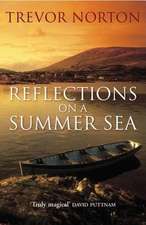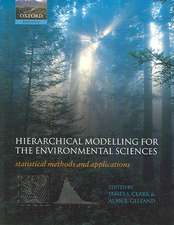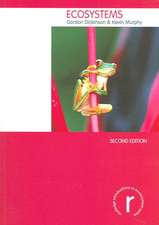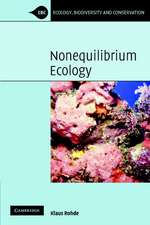Eutrophication in Coastal Ecosystems: Towards better understanding and management strategies: Developments in Hydrobiology, cartea 207
Editat de Jesper H. Andersen, Daniel J. Conleyen Limba Engleză Hardback – 2 sep 2009
The book is based on selected papers from the Second International Symposium on Research and Management of Eutrophication in Coastal Ecosystems, held 20-23 June 2006 in Nyborg, Denmark.
| Toate formatele și edițiile | Preț | Express |
|---|---|---|
| Paperback (1) | 792.00 lei 38-44 zile | |
| SPRINGER NETHERLANDS – 14 mar 2012 | 792.00 lei 38-44 zile | |
| Hardback (1) | 959.98 lei 3-5 săpt. | |
| SPRINGER NETHERLANDS – 2 sep 2009 | 959.98 lei 3-5 săpt. |
Din seria Developments in Hydrobiology
- 18%
 Preț: 1229.10 lei
Preț: 1229.10 lei - 18%
 Preț: 963.91 lei
Preț: 963.91 lei - 15%
 Preț: 648.24 lei
Preț: 648.24 lei - 15%
 Preț: 637.89 lei
Preț: 637.89 lei -
 Preț: 378.23 lei
Preț: 378.23 lei - 15%
 Preț: 644.95 lei
Preț: 644.95 lei - 18%
 Preț: 952.09 lei
Preț: 952.09 lei - 20%
 Preț: 558.87 lei
Preț: 558.87 lei - 18%
 Preț: 1833.65 lei
Preț: 1833.65 lei -
 Preț: 393.59 lei
Preț: 393.59 lei -
 Preț: 406.54 lei
Preț: 406.54 lei - 18%
 Preț: 1226.73 lei
Preț: 1226.73 lei - 18%
 Preț: 956.99 lei
Preț: 956.99 lei -
 Preț: 388.87 lei
Preț: 388.87 lei - 24%
 Preț: 1060.51 lei
Preț: 1060.51 lei - 18%
 Preț: 1229.28 lei
Preț: 1229.28 lei - 20%
 Preț: 569.30 lei
Preț: 569.30 lei -
 Preț: 368.79 lei
Preț: 368.79 lei - 24%
 Preț: 817.46 lei
Preț: 817.46 lei - 18%
 Preț: 958.25 lei
Preț: 958.25 lei - 18%
 Preț: 953.03 lei
Preț: 953.03 lei -
 Preț: 384.75 lei
Preț: 384.75 lei - 24%
 Preț: 1582.91 lei
Preț: 1582.91 lei - 24%
 Preț: 1051.68 lei
Preț: 1051.68 lei - 18%
 Preț: 943.57 lei
Preț: 943.57 lei - 18%
 Preț: 1235.76 lei
Preț: 1235.76 lei - 24%
 Preț: 800.02 lei
Preț: 800.02 lei - 24%
 Preț: 803.55 lei
Preț: 803.55 lei - 18%
 Preț: 948.29 lei
Preț: 948.29 lei
Preț: 959.98 lei
Preț vechi: 1170.71 lei
-18% Nou
Puncte Express: 1440
Preț estimativ în valută:
183.69€ • 191.79$ • 152.03£
183.69€ • 191.79$ • 152.03£
Carte disponibilă
Livrare economică 15-29 martie
Preluare comenzi: 021 569.72.76
Specificații
ISBN-13: 9789048133840
ISBN-10: 904813384X
Pagini: 269
Ilustrații: 264 p.
Dimensiuni: 193 x 260 x 15 mm
Greutate: 0.86 kg
Ediția:2009
Editura: SPRINGER NETHERLANDS
Colecția Springer
Seria Developments in Hydrobiology
Locul publicării:Dordrecht, Netherlands
ISBN-10: 904813384X
Pagini: 269
Ilustrații: 264 p.
Dimensiuni: 193 x 260 x 15 mm
Greutate: 0.86 kg
Ediția:2009
Editura: SPRINGER NETHERLANDS
Colecția Springer
Seria Developments in Hydrobiology
Locul publicării:Dordrecht, Netherlands
Public țintă
ResearchCuprins
Eutrophication in coastal marine ecosystems: towards better understanding and management strategies.- Eutrophication and the macroscope.- Ecosystem thresholds with hypoxia.- Nutrient enrichment and fisheries exploitation: interactive effects on estuarine living resources and their management.- Assessment of the eutrophication status of transitional, coastal and marine waters within OSPAR.- Can the EU agri-environmental aid program be extended into the coastal zone to combat eutrophication?.- Eutrophication and agriculture in Denmark: 20 years of experience and prospects for the future.- Odense Pilot River Basin: implementation of the EU Water Framework Directive in a shallow eutrophic estuary (Odense Fjord, Denmark) and its upstream catchment.- Relationship between eutrophication reference conditions and boundary settings considering OSPAR recommendations and the Water Framework Directive—examples from the German Bight.- Modelling the distribution and growth of ‘problem’ green seaweed in the Medway estuary, UK.- Short-term effect of oxic to anoxic transition on benthic microbial activity and solute fluxes in organic-rich phytotreatment ponds.- Denitrification efficiency for defining critical loads of carbon in shallow coastal ecosystems.- Responses of benthic-pelagic coupling to climate change in a temperate estuary.- Potential phytoplankton indicator species for monitoring Baltic coastal waters in the summer period.- Using bio-optics to investigate the extent of coastal waters: A Swedish case study.- Identification of the coastal zone of the central and eastern Gulf of Finland by numerical modeling, measurements, and remote sensing of chlorophyll a.- Interactions of light and organic matter under contrasting resource simulated environments: the importance ofclonal traits in the seagrass Zostera noltii.- Long-term modeling of large-scale nutrient cycles in the entire Baltic Sea.- Response of eutrophication in the eastern Gulf of Finland to nutrient load reduction scenarios.- Modeling eutrophication and oligotrophication of shallow-water marine systems: the importance of sediments under stratified and well-mixed conditions.- Reference conditions for phytoplankton at Danish Water Framework Directive intercalibration sites.- Coastal eutrophication research: a new awareness.
Textul de pe ultima copertă
Coastal eutrophication has been and still remains an important issue for the scientific community. Despite many efforts to mitigate coastal eutrophication, the problems associated with eutrophication are still far from being solved. This book focusses on the most recent scientific results in relation to specific eutrophication issues, e.g. definition(s) and causes; nutrient loads, cycling and limitation; reference conditions, primary effects and secondary effects; trend reversal (oligotrophication), as well as links to other pressures (climate change and top/down control). It also focusses on monitoring and modelling of coastal eutrophication, and adaptive and science-based nutrient management strategies.
The book is based on selected papers from the Second International Symposium on Research and Management of Eutrophication in Coastal Ecosystems, held 20-23 June 2006 in Nyborg, Denmark.
The book is based on selected papers from the Second International Symposium on Research and Management of Eutrophication in Coastal Ecosystems, held 20-23 June 2006 in Nyborg, Denmark.
Caracteristici
Presents the most recent results and experiences with regard to research and management of coastal eutrophication Gives a good overview of the current understanding of nutrient enrichment and eutrophication in coastal waters
